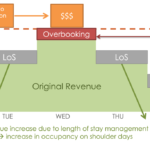Blog

Objective:
Discounting is not an effective way to increase Revenues. Discounting can possibly drop your yield if desired volume is not generated.
Challenge:
Very often hotels get desperate to discount during distressed times of low occupancy levels. Such discounts are adhoc and limitless predicting a certain volume. Hotels often assume that by way of dropping its pricing it would increase the sale. Unless hotels have a very specific mechanism to track the volume of business when such discounts are offered you actually would never know when you started discounting nor when to stop.
Around 2003, when McKinsey conducted a study of 1500 companies across a range of industries on the impact of difference profit levers the one of the key finding proved that 1% increase in pricing can lead to a 11% increase in profits. Then how discounting can bring in more profits. So should hotel discount or not? There are two kinds of discounting – Adhoc discount & Qualified Discount.
Adhoc discount is limitless and unconditional however a Qualified discounting is conditional. When you discount you need to get something in return which is generally big in volume or when there is a need/when you want the business. You want to capture more demand by eating into your competition hotels.
On the other hand when you discount what happens to the perceived value of your product in customer’s mind. You rise too many questions in the customer’s mind.
Are you a cheap product? Is your quality questionable? Will you discount more if bargained/negotiated? Or wait and watch out for more discount – will that delay your sale or loose the opportunity at all? Are you giving the full benefits/attributes of the product it deserves? Are you flexible? Is there any hidden terms & conditions?
Such questions are answered when we make a customer to be qualified to enjoy a discount, How do we do that?
Discount only on your dynamic pricing which generally the BEST AVAILABLE RATE. For this reason, we also use derivative Best Available Rates. These rates are above or below the Best Available Rate and are derived from or in some way linked to the Best Available Rate for that particular day. So any change to the Best Available Rate affects these rates too. Typical derivative rates include value-added package rates, advance purchase rates, non-refundable rates, and negotiated rates.
Try not to get into discounting your fixed/contracted rate out of desperation which could create risks in sticking to the discount values on the contracted pricing. Discount your product by creating a fencing around it. Create two levels of discounts and make sure the customer has to qualify to enjoy such discounts.
Create Small Discounts & Deeper Discounts.
Smaller Discounts are generally a very small percentage of discounts fenced lightly. Deeper Discounts are always a higher percentage of discount are heavily fenced. What is fencing: Create a condition around the sale. Some of such fencing/conditions are:
Stay through on a shoulder nights,
Cancellation fee,
Minimum length of stay,
Advance purchase – buy before certain number of days,
Full deposit required,
Non refundable & Non cancellable, etc.
Based on the above factors of fencing you could create a discount structure and fence them accordingly. Ensure that you don’t heavily fence all discounts and land up not making a sale at all. On the other hand do not land up with lower yields by fencing lightly. During the process of discounting ensure that you have an optimal rate/price to capture such demand. Remember that discounting is also limited to certain channels based on the fencing. For eg., you could choose to extend the discount when a customer is contacting your hotel reservation centre vs online purchase which is more secured with guarantee or payment. By this way it also helps to channelise your sales in a more organised manner. Have an absolute control over your discounts by choosing the right period. For eg., know when to start and stop discounting. If you cannot stop you might as well not start.
Recommendation / Conclusion:
The idea of discounting is to ensure that you secure long haul bookings and also not to miss out on sale of last minute inventory that does not have much time to sell. The whole idea of discounting is to capture more demand during the low occupancy levels and helps filling up the shoulder nights and create a threshold occupancy. Once you are convinced the quantum of sale achieved and measurable by discounting you would know when to stop.
Happy Selling!
Subscribe & Follow
Recent Tweets
Recent Posts
-

Unlocking Profitability Through Revolutionary Revenue Management: A…
December 15, 2023 -

Why is it important to segment your…
November 30, 2023 -

Full pattern Length of Stay controls increase…
September 26, 2023 -

Achieving the Right Mix of Strategic &…
January 11, 2019 -

Better Budgeting Through Revenue Management
December 21, 2018
Facebook Posts
getRevOpt
Go beyond organic to Expenential Growth
BRING IN THE EXPERTSWhat makes Revopt Unique?
Our unparalleled services helps hotels, chains and management companies develop collective
knowledge of revenue management and upskill their teams to drive exponential revenue.
-
Exponential Revenue
GrowthRevOpt helps you to go beyond organic to Exponential Growth by unlocking the true revenue potential to achieve optimal performance.
-
Automated Revenue
Management SystemCustom tailored to your exact needs. Increased revenues 6%-18%. Multiply profits in as little as 15 minutes per day. Outperform competitiors by 36% or more.
-
Long-term Profitability
& Asset ValueTailor made revenue optimization solution to create a sustainable growth strategy to increase profitability & long-term asset value.
-
Expertise with
unparallelled ServicesRevOpt best industry practices, proven techniques, latest trends & strategies that help hotels to challenge the status quo & outperform the competitors.
